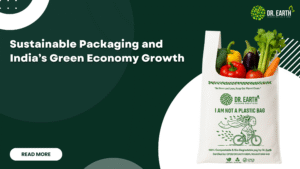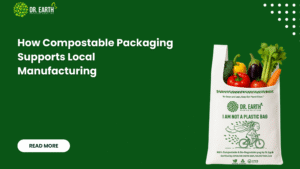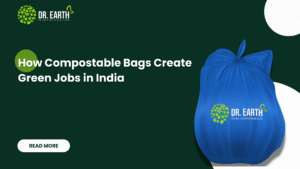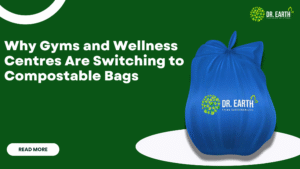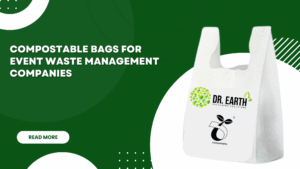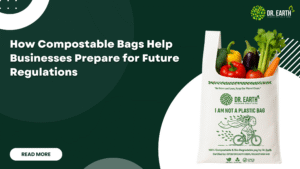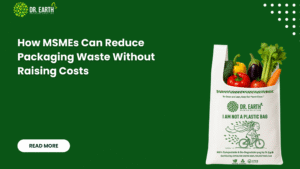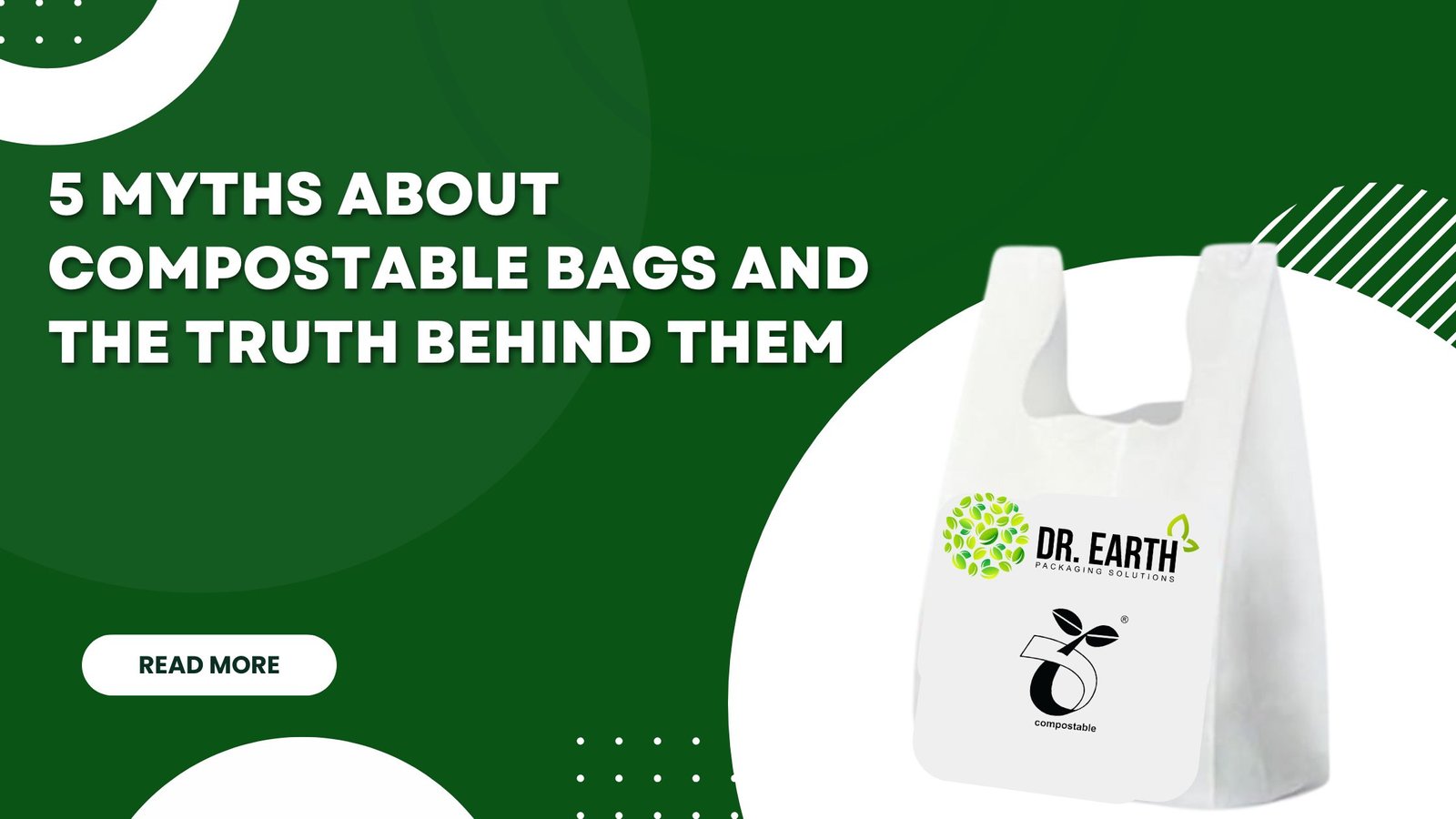
Compostable bags have become a popular eco-friendly option to replace plastic bags, minimizing environmental pollution and encouraging green living. Though they are increasingly popular, there are a number of myths and misconceptions about compostable bags that confuse consumers. In this blog, we will bust the top five myths about compostable bags and reveal the truth behind them. Being a top compostable bag manufacturer, Dr Earth seeks to give the right information and encourage responsible use of these eco-friendly products.
Myth 1: Compostable Bags Are the Same as Biodegradable Bags
The Truth:
Most individuals think that “compostable” and “biodegradable” are synonymous, but they are not. Both words describe the degradation of products in nature, but compostable bags break down into natural components without any toxic residue. Biodegradable bags, however, can take a long time to break down and can leave behind microplastics.
Dr Earth makes sure that its compostable bags adhere to rigorous certification standards, which ensure that they disintegrate in conditions of composting within a certain period. Compostable bags differ from biodegradable plastics since they add nutrients to the soil rather than contaminating the environment.
Compostable bags also go through immense testing to certify that they fit into world composting standards. It implies that they satisfy rigorous requirements to disintegrate totally without injuring plants, animals, or the environment.
Myth 2: Compostable Bags Are Not Strong Enough for Daily Use
The Truth:
One of the most prevalent myths is that compost bags are weak and will tear easily. But with the development of compostable materials, these bags are as strong as regular plastic bags.
Dr Earth’s bags are also compostable, using high-grade plant-based resources like cornstarch and PLA (polylactic acid) that provide immense strength and elasticity. They are ideal for supermarket shopping, waste food disposal, and general-purpose storage without having to sacrifice toughness.
These bags are made to withstand daily wear and tear, such as being used to carry heavy groceries, and wet waste. Most companies, ranging from supermarkets to restaurants, have been able to replace plastic bags with compostable bags without losing functionality.
Myth 3: Compostable Bags Will Decompose Too Quickly
The Truth:
Some customers fear that compostable bags will begin to degrade soon after they leave the store or when they become wet. The truth is, compostable bags are made so that they last through regular handling and only biodegrade once they are introduced to the optimal composting conditions, including temperature, water content, and microbes.
Dr Earth compost bags have a shelf life that is stable and will not break down until they are put into an industrial or domestic composting system. They provide a convenient and safe way of transporting merchandise while allowing for environmentally friendly disposal.
To be stored optimally, compostable bags must be stored in a dry, cool location, away from sunlight. When disposed of properly, they break down within a few months, as opposed to plastic bags that remain in the environment for centuries.
Myth 4: Compostable Bags Cannot Handle Heavy Loads
The Truth:
The other common myth is that compost bags cannot be used for heavy loads. Although early types of compost bags were limited in their carrying capacity, advances in technology have enhanced their ability to carry loads quite a lot.
Dr Earth’s compostable carry and grocery bags are extensively tested to make sure they are able to support heavy weight without leaking or tearing. The bags can be utilized for pet waste, garden waste, groceries, and other domestic purposes with assurance.
Several retail, food delivery, and packaging businesses have managed to switch to compostable bags with no problem of durability. The shift facilitates companies in achieving their sustainability objectives while preserving usability for their clients.
Myth 5: Compostable Bags Do Not Make a Real Difference for the Environment
The Truth:
People usually doubt whether compostable bags can really make a difference in the environment. Nevertheless, compostable bags really reduce plastic waste and help achieve sustainable waste management. Plastic bags are known to take centuries to degrade, while compostable bags degrade within months when composted under the right conditions.
Dr Earth’s purpose is to make the world a cleaner and greener place by providing eco-friendly alternatives to plastic. Through the use of compostable bags, consumers become actively involved in decreasing landfill waste and ocean pollution and promoting a circular economy.
Compostable bags minimize the carbon footprint of plastic manufacturing since they are made from renewable resources instead of fossil fuels. By using them, one contributes to a sustainable future for the world and human health.
Conclusion:
Myths surrounding compostable bags can slow their general use, but learning the truth can assist in making consumers’ informed decisions. Dr Earth is committed to offering superior-quality compostable bags that are strong, durable, and contribute positively to the environment. By dispelling these myths, we expect to promote more customers to utilize eco-friendly solutions and decrease their use of plastic.
Switch to Dr Earth’s compostable bags today and be part of a cleaner, greener tomorrow!
FAQs
Q- 1. How long does it take for compostable bags to decompose?
Ans- Compostable bags decompose in three to six months under industrial composting conditions. In home composting, the time will be slightly longer, depending on temperature, moisture, and microbial activity.
Q- 2. Can compostable bags be recycled?
Ans- No, compostable bags must not be sent into recycling bins. They must be sent to a composting facility or home compost to break down successfully.
Q- 3. Are compostable bags safe for food storage?
Ans- Yes, Dr Earth’s compostable bags are food-safe and contain no harmful chemicals, so they are perfect for storing fresh vegetables, groceries, and leftovers.
Q- 4. Do compostable bags break down in landfills?
Ans-Landfills do not have the proper conditions for composting, i.e., oxygen and microbial action. It’s always better to compost these bags in a proper environment to help decompose properly.
Q- 5. Where can I buy Dr Earth’s compostable bags?
Ans- Dr Earth’s compostable bags can be purchased online at their website and at some select retail partners. Go to their website to learn more about different options and make the world a greener place.
Share:
Related Posts



